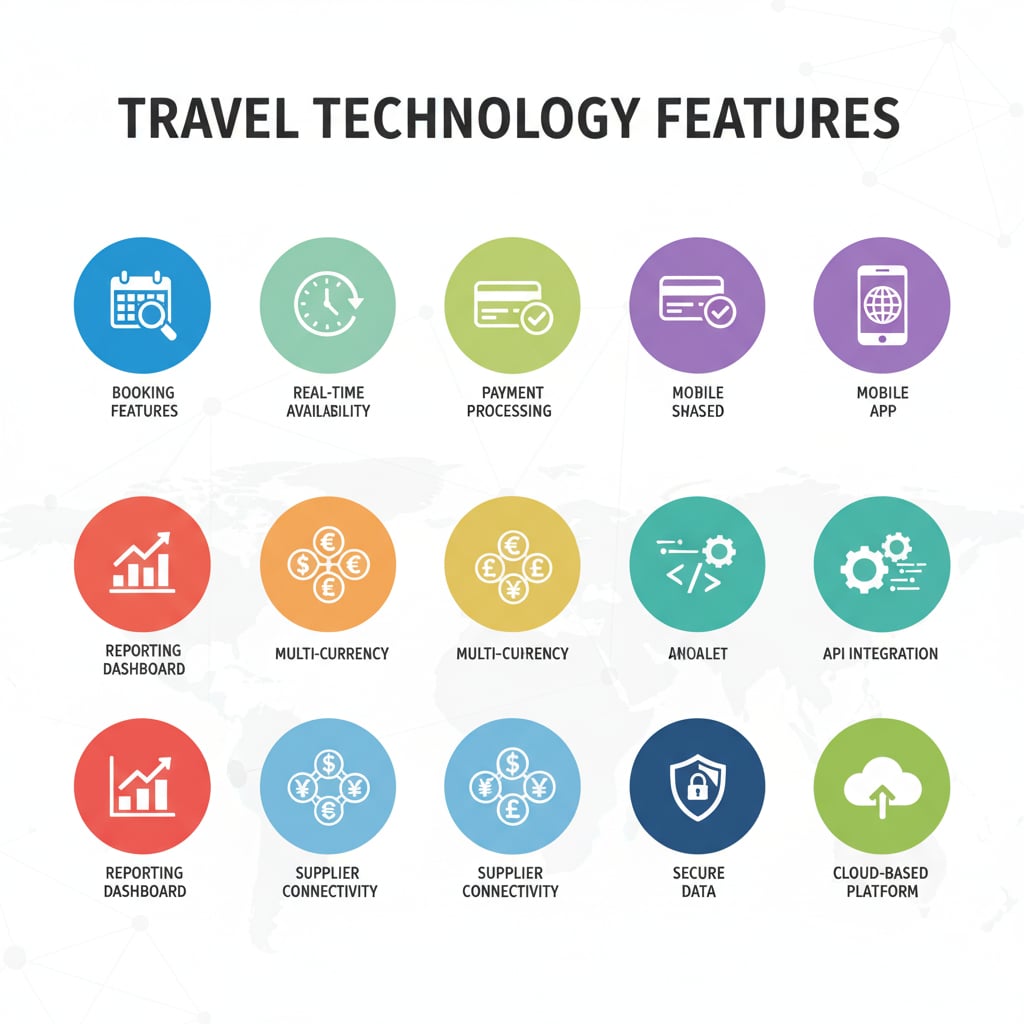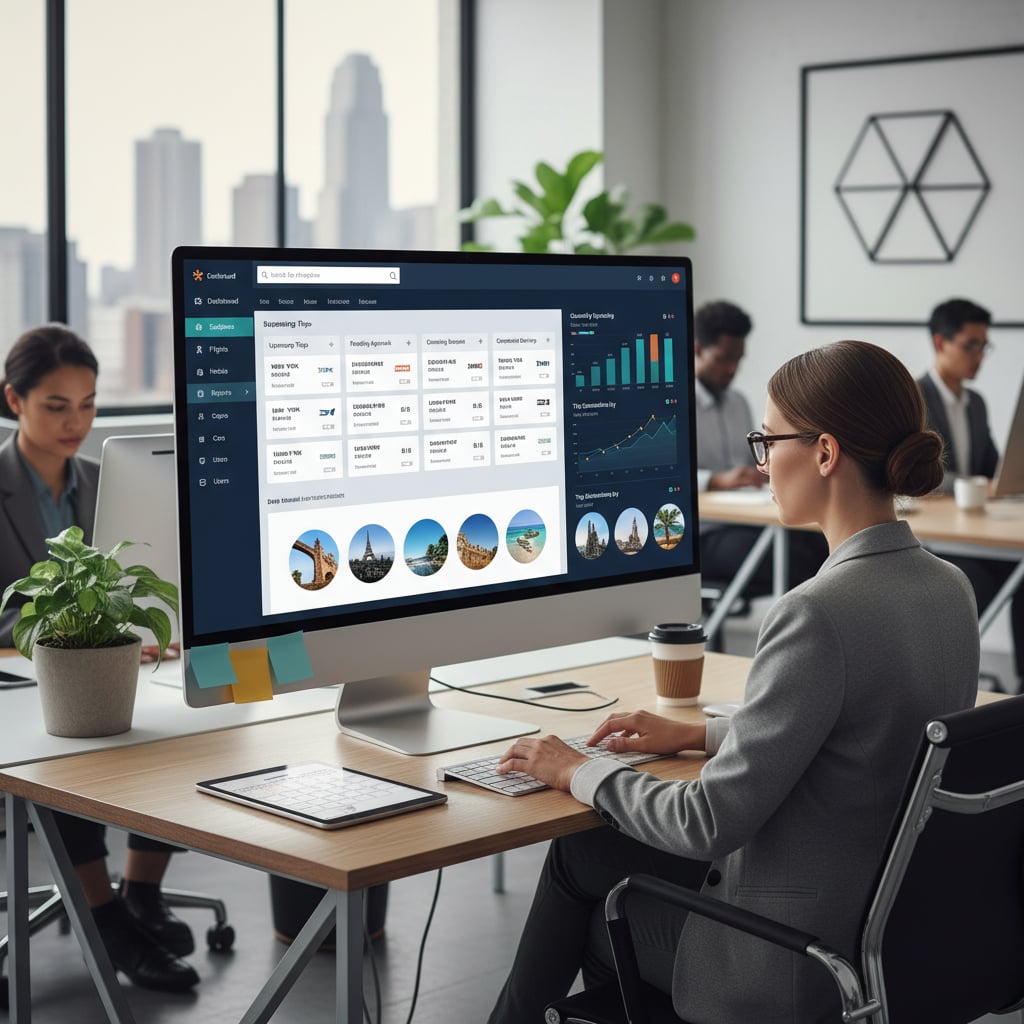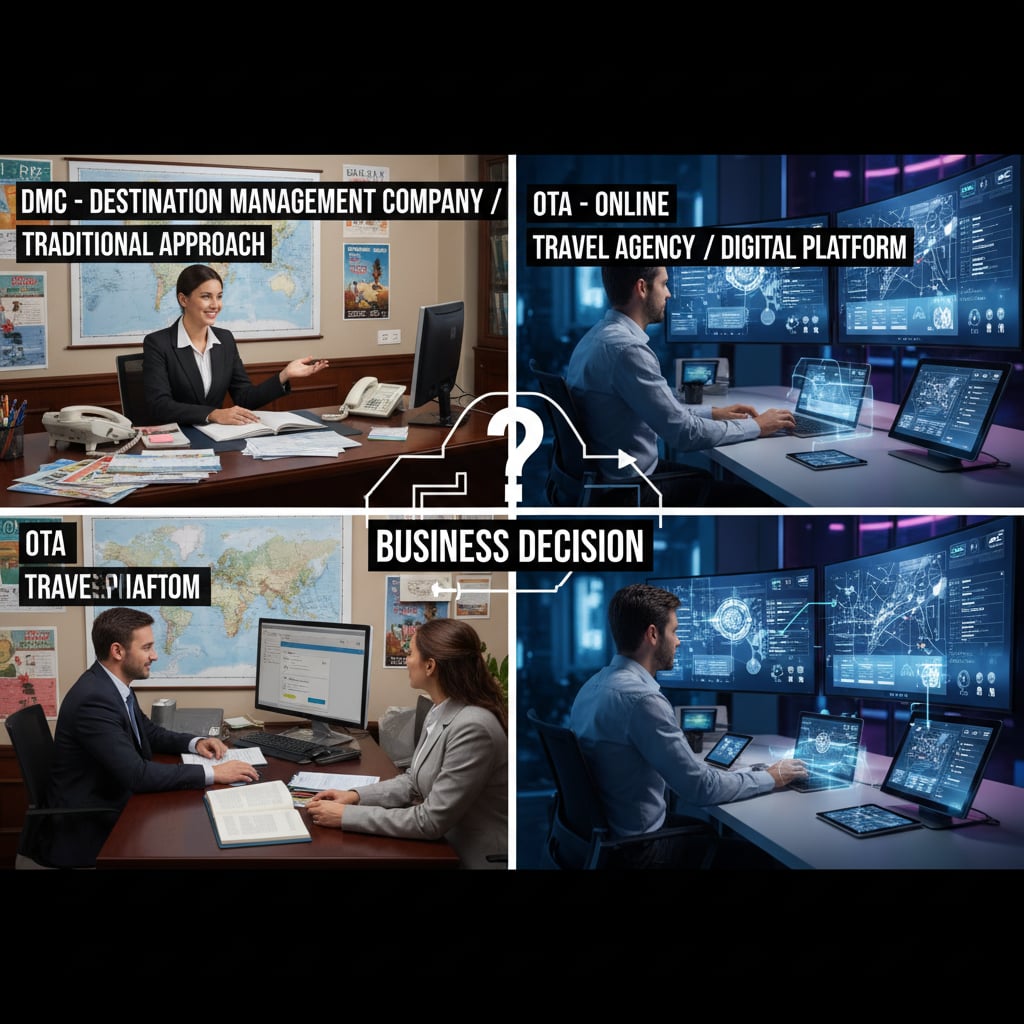Not all B2B travel portals are created equal. While basic platforms might help with hotel bookings, truly modern systems offer comprehensive features that transform how travel agencies operate. Whether you're evaluating your current platform or shopping for your first B2B travel portal, these ten features separate industry-leading solutions from the rest.
1. Real-Time Inventory with Live Availability
Nothing frustrates clients more than being told a property is available, only to discover hours later that it's sold out. Modern B2B travel portals connect directly to supplier inventory systems, providing real-time availability that you can trust.
What to look for:
- Direct API connections to supplier systems (not cached data from 24 hours ago)
- Live availability display updated as you search
- Inventory lock features that hold rooms while you finalize bookings
- Clear indicators showing last availability updates
Real-time inventory means you can confidently quote and book without the anxiety of overselling or disappointing clients. It's the foundation of professional service in 2025.
2. Instant Booking Confirmations
The days of "request and wait" are over. Top-tier portals provide instant confirmations for the majority of bookings, meaning your clients receive vouchers within minutes rather than days.
Key capabilities include:
- Auto-confirmation: Bookings confirmed instantly without supplier intervention
- Electronic vouchers: Professional PDFs generated immediately upon payment
- Confirmation tracking: Dashboard showing confirmation status for all bookings
- Automated notifications: Email and SMS alerts to agents and clients
This feature alone can dramatically improve client satisfaction. When competitors are still waiting for email responses, you're delivering confirmed vouchers. That speed creates perceived value and builds trust.
"Instant confirmations changed everything for us. We can now close bookings on phone calls instead of promising to follow up later. Our conversion rate improved by 35%."
— Jennifer Tan, Wanderlust Travel Consultants
3. Multi-Currency Support with Auto-Conversion
Travel is international by nature, yet many agencies struggle with currency conversions, exchange rate fluctuations, and multi-currency invoicing. A sophisticated B2B travel portal handles all of this seamlessly.
Essential currency features:
- Display pricing in multiple currencies simultaneously
- Automatic conversion using live exchange rates
- Invoice generation in client's preferred currency
- Commission tracking across different currencies
- Exchange rate lock features for confirmed bookings
This is particularly valuable for agencies serving international clients or booking services in multiple countries. Imagine building a Singapore-Malaysia-Thailand package where suppliers quote in three different currencies—your portal should handle the complexity automatically.
4. Mobile-Responsive Design
Travel doesn't happen on a schedule, and neither do booking inquiries. Whether you're at a networking event, meeting clients over coffee, or simply away from your desk, you need full portal functionality on your smartphone or tablet.
Mobile must-haves:
- Responsive design that adapts to all screen sizes
- Full search and booking capabilities on mobile
- Touch-optimized interface elements
- Fast loading times even on cellular connections
- Offline access to booking history and vouchers
A truly mobile-first platform doesn't just shrink the desktop interface—it reimagines workflows for touch interaction and smaller screens. Test any portal on your phone before committing; if it's clunky or limited, that's a red flag.
5. Automated Documentation and Branding
Professional presentation matters. Your clients should receive polished, branded documents—not generic templates with supplier logos dominating your work.
Documentation features to prioritize:
- Custom branding: Add your logo, colors, and company details to all documents
- Automated generation: Vouchers, invoices, and itineraries created with one click
- Customizable templates: Adjust layouts and content to match your brand
- Multi-format export: PDF, Word, and email-ready formats
- Terms and conditions: Include your agency's policies automatically
The portal should handle the busy work while you maintain your brand identity. Every document becomes a marketing opportunity when it showcases your professionalism.
6. Comprehensive API Integration
Your B2B travel portal shouldn't exist in isolation. Modern platforms integrate with your other business tools, creating a seamless technology ecosystem.
Critical integrations include:
- Accounting software: Automatic export to QuickBooks, Xero, or similar platforms
- CRM systems: Sync client data and booking history
- Payment gateways: Accept credit cards, PayPal, and local payment methods
- Email marketing: Trigger automated campaigns based on booking behavior
- Communication tools: Integration with WhatsApp Business, Slack, or similar platforms
API capabilities also future-proof your investment. As new tools emerge, integration-ready portals can adapt without requiring you to abandon your core booking system.
7. Digital Wallet and Credit Management
Cash flow challenges plague travel agencies: you pay suppliers upfront but collect from clients later. Digital wallet systems within B2B portals address this through prepaid credits that streamline booking and payment.
Wallet system benefits:
- Pre-load funds for instant booking without per-transaction payments
- Track credit balance and usage in real-time
- Automatic top-up options when balance runs low
- Transaction history and downloadable statements
- Credit limits and spending controls for team members
This feature transforms financial management: instead of processing payments for each booking, you maintain a balance and book instantly. It's faster, cleaner, and significantly reduces administrative overhead.
8. Commission Tracking and Financial Reporting
Profitability requires visibility. You need to know exactly what you're earning, which products perform best, and where your revenue comes from.
Financial reporting essentials:
- Commission visibility: See earnings on every booking before confirming
- Revenue reports: Daily, weekly, monthly, and annual revenue summaries
- Product performance: Identify which hotels, tours, or destinations drive profit
- Agent performance: Track individual team member productivity and earnings
- Tax documentation: Generate reports formatted for accounting and tax filing
- Export capabilities: Download data in Excel, CSV, or PDF formats
These insights help you make data-driven decisions: which suppliers to prioritize, which products to market more aggressively, and where to focus sales efforts for maximum ROI.
9. Multi-Product Booking in a Single Transaction
Complex itineraries involve multiple products: hotels, tours, transfers, activities, and more. Your portal should allow you to book everything together, creating comprehensive packages without switching between different systems or suppliers.
Multi-product capabilities:
- Add hotels, tours, and transfers to a single booking cart
- Calculate total pricing automatically across all products
- Generate unified itineraries combining all services
- One payment covers the entire package
- Single confirmation number for client convenience
This feature is the difference between portals and platforms. Basic portals handle individual bookings; comprehensive platforms manage complete travel experiences. Your clients want packages, not piecemeal services, and your portal should support that.
10. 24/7 Access with Reliable Uptime
Travel booking happens around the clock, especially when serving international clients across time zones. Your portal needs to be available whenever you need it—and downtime is simply unacceptable.
Infrastructure requirements:
- 99.9%+ uptime guarantee: Written service level agreements (SLAs)
- Global server infrastructure: Fast access regardless of your location
- Redundancy and backups: No single point of failure
- Regular maintenance windows: Scheduled updates that don't disrupt business hours
- Status monitoring: Public uptime dashboards showing system health
Ask potential providers about their hosting infrastructure, disaster recovery plans, and historical uptime. If they can't provide concrete data, that's concerning. Your business depends on system reliability—don't compromise on this.
Bonus Feature: Exceptional Support
While not a software feature per se, quality support deserves mention. Even the best portals occasionally present questions or issues. How quickly can you reach someone? How knowledgeable are they? Is support available when you need it?
Support standards to expect:
- Multiple contact channels: phone, email, live chat, WhatsApp
- Fast response times (under 2 hours for critical issues)
- Knowledgeable support staff who understand travel operations
- Comprehensive documentation and video tutorials
- Regular training webinars for new features
Test support before committing: contact them with questions during your trial period. Their responsiveness and helpfulness will reveal how they treat paying customers.
Evaluating Portals: What Questions to Ask
When demoing B2B travel portals, ask these questions to assess feature quality:
- "Can you show me real-time availability in action, with a refresh to prove it's live?"
- "How many currencies do you support, and where do exchange rates come from?"
- "Can I use the full platform on my smartphone right now?"
- "What APIs do you integrate with, and how difficult is setup?"
- "Show me your commission reporting—how detailed does it get?"
- "Can I book a hotel, transfer, and tour together in one transaction?"
- "What's your average uptime over the past 12 months?"
- "What happens if I encounter an issue at 2 AM on a Sunday?"
Quality providers will answer confidently and demonstrate features in real-time. Vague responses or reluctance to show specific functionality should raise concerns.
The Hidden Cost of Missing Features
It's tempting to choose portals based solely on subscription cost or commission rates. But missing critical features costs you in ways that aren't immediately obvious:
- Time waste: Manual workarounds for missing features consume hours weekly
- Lost bookings: Slow confirmations mean losing clients to faster competitors
- Errors and amendments: Manual processes introduce mistakes that require costly fixes
- Professional image: Generic documents and clunky workflows make you look amateur
- Scalability limits: Basic portals can't support growth without adding staff
Calculate the true cost: what's your time worth? How many bookings do you lose to slow processes? What does a single booking error cost in time and client trust? Often, premium portals with comprehensive features deliver significantly better ROI than "cheap" alternatives with limited capabilities.
Implementation: Getting Your Team Onboard
Even the best portal fails if your team doesn't embrace it. Successful implementation requires:
- Comprehensive training: Ensure every team member is comfortable with core features
- Phased rollout: Start with simple bookings, then expand to complex packages
- Champion designation: Assign a team member to become the internal expert
- Feedback loops: Regular check-ins to address challenges and share tips
- Performance tracking: Monitor metrics before and after implementation to demonstrate value
Change is challenging, but the agencies that successfully transition to modern portals almost never look back. The efficiency gains and capability improvements are simply too significant.
Future-Proofing Your Choice
Technology evolves rapidly. When selecting a portal, consider its development trajectory:
- Regular updates: Frequent feature releases indicate active development
- Roadmap transparency: Providers should share upcoming features and timelines
- User feedback incorporation: Do they listen to customer suggestions?
- Industry trend adoption: Are they implementing emerging technologies like AI?
- Longevity indicators: Company stability, funding, client growth
You're not just buying software for today—you're choosing a platform partner for years to come. Select wisely.
Conclusion: Features Drive Results
The ten features outlined above represent the current standard for professional B2B travel portals in 2025. As you evaluate options, use this list as your checklist. Missing one or two features might be acceptable if the platform excels elsewhere, but significant gaps should give you pause.
Remember: your portal is infrastructure, not just a tool. It's the foundation upon which you build client experiences, manage operations, and scale your business. Invest in a platform that grows with you, supports your vision, and delivers the features you need to compete effectively.
The travel industry moves fast, and agencies with modern technology have a decisive advantage. Don't let an outdated or feature-poor portal hold you back from your potential.
Ready to experience these features firsthand? Explore our comprehensive B2B platform or schedule a personalized demo to see how we've implemented each of these critical capabilities. Your agency deserves the best—and the best delivers measurable results.



